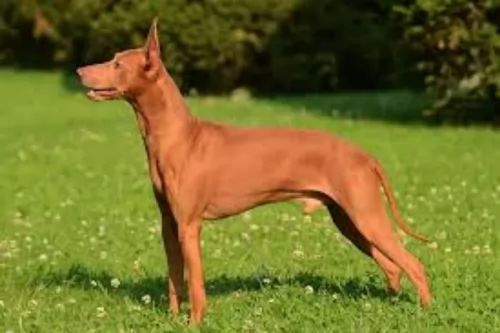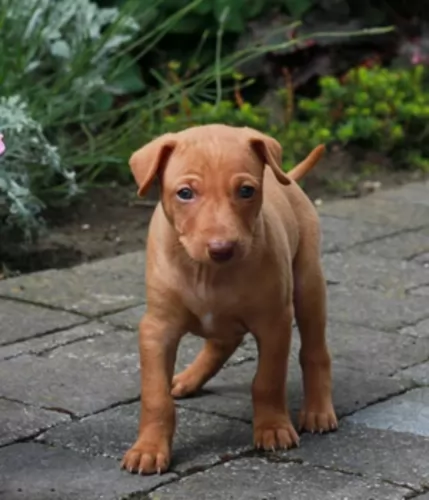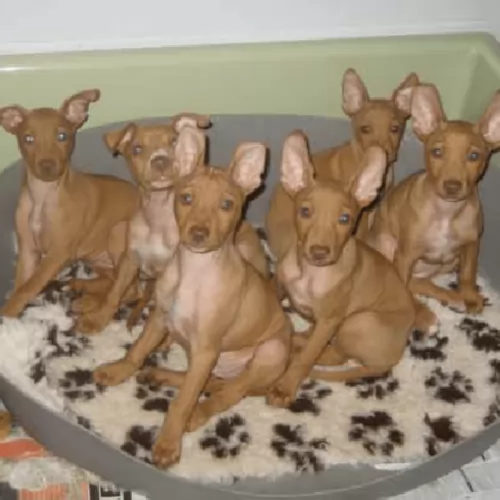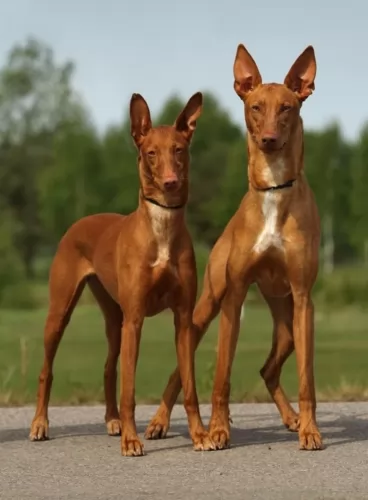 Petzlover
Petzlover Cirneco dell'Etna is originated from Italy but Spanish Pointer is originated from Spain. Cirneco dell'Etna may grow 15 cm / 5 inches shorter than Spanish Pointer. Cirneco dell'Etna may weigh 18 kg / 39 pounds lesser than Spanish Pointer. Cirneco dell'Etna may live 3 years less than Spanish Pointer. Cirneco dell'Etna may have more litter size than Spanish Pointer. Cirneco dell'Etna requires Moderate Maintenance. But Spanish Pointer requires Low Maintenance
Cirneco dell'Etna is originated from Italy but Spanish Pointer is originated from Spain. Cirneco dell'Etna may grow 15 cm / 5 inches shorter than Spanish Pointer. Cirneco dell'Etna may weigh 18 kg / 39 pounds lesser than Spanish Pointer. Cirneco dell'Etna may live 3 years less than Spanish Pointer. Cirneco dell'Etna may have more litter size than Spanish Pointer. Cirneco dell'Etna requires Moderate Maintenance. But Spanish Pointer requires Low Maintenance
 The Cirneco dell’Etna comes from the island of Sicily and not mainland Italy, although it is considered an Italian dog. It is a small dog that hunted rabbits and its calling card was its ability to go for hours without water or food. They have terrific endurance and a good sense of smell. They were developed for the harsh terrain they worked around places like Mount Etna. Of all the Mediterranean island hunting dogs, the Cirneco de’Etna is the smallest.
The Cirneco dell’Etna comes from the island of Sicily and not mainland Italy, although it is considered an Italian dog. It is a small dog that hunted rabbits and its calling card was its ability to go for hours without water or food. They have terrific endurance and a good sense of smell. They were developed for the harsh terrain they worked around places like Mount Etna. Of all the Mediterranean island hunting dogs, the Cirneco de’Etna is the smallest.
This is a very ancient breed, surviving on its hunting skills alone for thousands of years on Sicily. They then became guard dogs for the peasants. Because they had such speed, sense of smell, alertness and sight, they were great hunters.
Today’s Cirneco de’Etna is highly competitive in confirmation and make terrific pets. They are exceedingly friendly, energetic and low maintenance. Lure coursing is what they really excel at. They are good at agility and pursuit games as well.
 The Spanish Pointer is a large hunting breed. The dog hails from Spain and it is believed that the dog was used to develop other pointing breeds.
The Spanish Pointer is a large hunting breed. The dog hails from Spain and it is believed that the dog was used to develop other pointing breeds.
It is popular in Spain but fairly unknown beyond Spanish borders. Known as the Burgos Pointer, the official name for the dog is Perdiguero de Burgos.
It is thought that the dog comes from mixing the Pachon Navarra and the Sabueso Espanol. The dog was developed to point out game so they have the typical longish head with the pointing tail.
 The Cirneco de’Etna is a sleek, muscular sighthound. His ears are close together and high on his head. The head is lean, and the skull is almost flat in profile. The muzzle is about the same length as the skull and the nose is large and its coloring matches the dog’s coat. They have hard pads the same color as their nails, but they are never black.
The Cirneco de’Etna is a sleek, muscular sighthound. His ears are close together and high on his head. The head is lean, and the skull is almost flat in profile. The muzzle is about the same length as the skull and the nose is large and its coloring matches the dog’s coat. They have hard pads the same color as their nails, but they are never black.
 The body of this dog is true to the Pointer type of dog with the body being muscular and lean.
The body of this dog is true to the Pointer type of dog with the body being muscular and lean.
He stands at between 62 to 67cm in height and weighs about 25 to 30kg. The ears are quite long and floppy and the tail is usually docked to a third of its length.
The coat which is mostly short can be whitish with tan or brown markings with freckling or it can be a brownish shade with darker brown markings.
The Spanish Pointer is a quiet, calm, gentle dog and not at all aggressive. They’re able to get on well with children and other pets.
They’re dogs that love the great outdoors and aren’t suited to city living. They’re dogs that need a good deal of exercise too. Being intelligent the pointer dog will benefit from training and socialization.
 Your attractive Spanish Pointer is such an amicable dog that it is a pleasure to have him around you.
Your attractive Spanish Pointer is such an amicable dog that it is a pleasure to have him around you.
He makes such a splendid pet, but only if their intense exercise needs are catered to. He can’t possibly be expected to spend days in a tiny yard with nothing to do. It would be cruel.
Their top priority is to be out in the fields hunting. Nonetheless he gets on well with children and other dogs, and with the right home and environment you’ll be so glad you chose one of these beautiful dogs as your friend.
 Like many dogs that come from ancient breeds with little cross breeding over the years, there are not a lot of inherited issues for the Cirneco de’Etna. Also, there are so few dogs remaining that little is known about their health in general and there are no studies to go on. Some breeders will do test despite the fact that none are recommended.
Like many dogs that come from ancient breeds with little cross breeding over the years, there are not a lot of inherited issues for the Cirneco de’Etna. Also, there are so few dogs remaining that little is known about their health in general and there are no studies to go on. Some breeders will do test despite the fact that none are recommended.
Their most common health issues are acquired such as injuries from running or competitions and obesity. Both can be controlled by the owner.
 The Spanish Pointer is a healthy dog breed that can live to be as old as 15 if he gets the right care.
The Spanish Pointer is a healthy dog breed that can live to be as old as 15 if he gets the right care.
Like other dogs, they can develop certain health problems, and you want to be aware of cherry eye, ear infections, hip dysplasia and allergies.
These dogs just love to swim, and it can be difficult to keep the inside of his ears from moisture.
Unfortunately wax, dirt and moisture can all cause an ear infection. Ear infections can be extremely painful. You’ll see your dog shaking his head and pawing at his ears. There will be redness inside the ear and possibly a discharge too. He will need to see the vet.
 The Cirneco needs a good quality food since they are such high energy dogs. Be careful not to overfeed them so that they become obese.
The Cirneco needs a good quality food since they are such high energy dogs. Be careful not to overfeed them so that they become obese.
As previously mentioned, the main concern for owners is injuries acquired while on a running course or in the activities of daily living. They have been known to hurt their feet. They need their ears checked regularly for any signs of infection or irritation. Clean out any excess water or dirt.
This is an intelligent, hardy breed that needs mental and physical stimulation. They need a job, or they can be a major problem. They love hunting of course but also excel at agility, lure crossing, and competition. He is loyal and loves being with people. Take him for long walks but don’t let him off the leash.
 As a hunting dog, the Spanish Pointer has always been used to a lot of exercise. If you don’t use him for hunting, you will need to take him on long walks. They just love sniffing around and following a scent. Ball and frisbee games where you get him running will be excellent for him.
As a hunting dog, the Spanish Pointer has always been used to a lot of exercise. If you don’t use him for hunting, you will need to take him on long walks. They just love sniffing around and following a scent. Ball and frisbee games where you get him running will be excellent for him.
The Spanish Pointer is a large hunting dog, so when you choose commercially manufactured dog food, make sure it’s for large breed dogs. Also make sure the food is for active dogs too.
The manufacturers of these dog foods know what vitamins and minerals to include for active dogs like these. Read the packaging carefully and avoid the inferior dog foods as they are full of ingredients that can make your dog sick.
Try and feed your Spanish Pointer some home-made food too. Make sure it isn’t spicy, exotic foods as these can cause digestive problems.
Food such as boiled chicken, brown rice or pasta, sweet potatoes, spinach and carrots are superb, simple food choices for your canine friend. You can chop it up and add some of this to the dry kibble twice a week as a treat for your pet.
Try and add some raw meat to the diet occasionally as this can be helpful in preventing skin infections.
The coat of your dog is short so a good brush twice a week will keep it in tip top condition. If he is super active, with a mitt or damp cloth you can wipe down his fur if it has mud stuck to it. It’s your time to check him over for ticks and fleas as well.